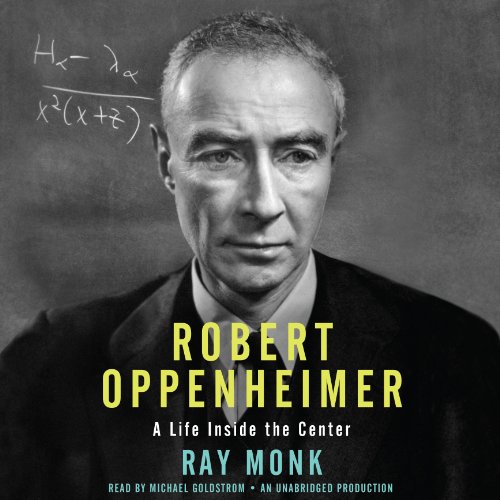$0.99/month for 3 months
$0.99$0.99
- Limited-Time Offer: Get Audible Premium Plus for $0.99 a month for the first 3 months.
- You'll receive 1 credit a month to pick ANY title from our entire premium selection to keep forever (you'll use your first credit now).
- You'll also get UNLIMITED listening to select audiobooks, Audible Originals, and podcasts.
- After 3 months, $14.95$14.95 /mo. Cancel online anytime.
 Your audiobook is waiting!
Your audiobook is waiting!
Enjoy a free trial on us
$0.00$0.00
- One credit a month to pick any title from our entire premium selection to keep (you’ll use your first credit now).
- Unlimited listening on select audiobooks, Audible Originals, and podcasts.
- You will get an email reminder before your trial ends.
- $14.95$14.95 a month after 30 days. Cancel online anytime.
One-time purchase:
-12% $26.61$26.61
 Preview
Preview When Prophecy Fails
 Audible Audiobook
– Unabridged
Audible Audiobook
– Unabridged
Originally published in 1956, When Prophecy Fails is a psychological study of a UFO cult and their belief of an apocalypse. It discusses the psychological dissonance experienced when the prophesied date passes with no event.
- Listening Length9 hours and 23 minutes
- Audible release dateJune 22, 2021
- LanguageEnglish
- ASINB097QBPRT5
- VersionUnabridged
- Program TypeAudiobook
People who bought this also bought
- Audible Audiobook
- Jesus Before the Gospels: How the Earliest Christians Remembered, Changed, and Invented Their Stories of the Savior
 Audible Audiobook
Audible Audiobook - Audible Audiobook
- Audible Audiobook
- Audible Audiobook
Related to this topic
- Rebbe: The Life and Teachings of Menachem M. Schneerson, the Most Influential Rabbi in Modern History
 Audible Audiobook
Audible Audiobook - Audible Audiobook
- Audible Audiobook
- Audible Audiobook
- Audible Audiobook
Only from Audible
- Audible Audiobook
- Audible Audiobook
- Audible Audiobook
- Audible Audiobook
- Audible Audiobook
Product details
| Listening Length | 9 hours and 23 minutes |
|---|---|
| Author | Leon Festinger, Henry W. Riecken, Stanley Schachter |
| Narrator | Warren Keyes |
| Audible.com Release Date | June 22, 2021 |
| Publisher | Yashiki Audio |
| Program Type | Audiobook |
| Version | Unabridged |
| Language | English |
| ASIN | B097QBPRT5 |
| Best Sellers Rank | #81,952 in Audible Books & Originals (See Top 100 in Audible Books & Originals) #73 in Divination (Audible Books & Originals) #83 in Prophecies #269 in Social Psychology |
Customer reviews
Customer Reviews, including Product Star Ratings help customers to learn more about the product and decide whether it is the right product for them.
To calculate the overall star rating and percentage breakdown by star, we don’t use a simple average. Instead, our system considers things like how recent a review is and if the reviewer bought the item on Amazon. It also analyzed reviews to verify trustworthiness.
Learn more how customers reviews work on AmazonCustomers say
Customers find this book to be a classic in psychological research, offering insights into cognitive dissonance and human behavior. The book is well-written, with one customer noting it reads like a novel, and customers find it incredibly interesting.
AI-generated from the text of customer reviews
Select to learn more
Customers find the book enlightening, describing it as a classic in psychological research that offers insights into cognitive dissonance and is the definitive study on human behavior.
"...From a theoretical and research perspective, it's a great field study designed to test Festinger's ideas about cognitive dissonance...." Read more
"...is influential in the field of social psychology, offering insights into cognitive dissonance, the psychology of belief, and how individuals and..." Read more
"...It stands as an important part of the professional literature, but the story would be better treated in summary format for modern readers...." Read more
"...Provides a fascinating insight into a small UFO cult as well as what happens when prophecies do not come to fruition - hence the tile of the book...." Read more
Customers find the book well-written and fun to read, with one customer noting it is presented in a very clear manner.
"...And the writing style is lucidly accessible and the detailed characterizations of the people involved and action unfolding are compelling enough for..." Read more
"...So I feel I can't really rate this - it's a classic in its field, it's incredibly interesting, but might also be seen as incredibly dodgy?" Read more
"While reading this wonderful classic for the first time, current examples of exactly the kind of cognitive dissonance introduced therein kept coming..." Read more
"This is a must read if you want to understand the directions and actions being taken in today's political arena...." Read more
Customers find the book incredibly interesting, with one mentioning that the action unfolding is compelling enough.
"...detailed characterizations of the people involved and action unfolding are compelling enough for even the casual reader...." Read more
"...I can't really rate this - it's a classic in its field, it's incredibly interesting, but might also be seen as incredibly dodgy?" Read more
"...In short, the book tells a fascinating, at times bizarre, at times hilarious, at times rather sad story, but at excessive length, and with too..." Read more
"Interesting, easy reading...." Read more
Top reviews from the United States
There was a problem filtering reviews. Please reload the page.
- Reviewed in the United States on September 18, 2009When Prophecy Fails is as relevant today as it was decades ago when a little doomsday cult predicted a flood that never came. I'm a professor in a social scientific-minded communication department. It seems that no matter what class I teach, I'm always using this book as an example. From a theoretical and research perspective, it's a great field study designed to test Festinger's ideas about cognitive dissonance. It also stands as a rigorous and meticulous example of the method of data collection via participant-observation. Readers will also appreciate the beginning material chronicling known failed predictions throughout history.
And the writing style is lucidly accessible and the detailed characterizations of the people involved and action unfolding are compelling enough for even the casual reader. I've always been a fan of Leon Festinger's work, but no matter one's personal givings about dissonance theory, it is tough not to appreciate the laborious efforts of this tireless and dedicated research team in producing this study. I admire those who are able to foresee real-world applications of their ideas in advance so as to be able to properly test them as the real-world events unfold. Festinger et al. were brilliant in this regard. A must-read for anyone interested in solid research methodologies and applied learning.
- Reviewed in the United States on September 17, 2017I picked this up because of a mention in a podcast, and found myself fascinated by the general premise. As anyone who's been hanging out in particular corners of media fandom know, there was quite a "prophecy" delivered by a "conspiracy" of people who claimed to read the "true signs" about the endgame between the two main characters of a certain popular BBC detective show. The fact that this did not come to pass on the foretold date has not made the "conspiracy" adherents disappear - indeed, some are more convinced than ever that their endgame is bound to happen.
Reading this book shows that this is a pattern as old as time, and they present two case studies where the endgame was the end of the world or the second coming (with flying saucers, in one case). It makes for riveting, baffling reading - humans are <I>strange</I>, and anything to do with belief and religion doubly so. It explains - or at least exemplifies - cognitive dissonance at its finest.
However, I also feel that it would be highly implausible that an ethics committee would approve the kind of study the authors engaged in back in 1953 today, and it's a bit unsettling reading about very private moments and crises of faith that members of this group had thinking themselves safe with their in-group, only to be riddled with observers bent on publishing everything they said. So I feel I can't really rate this - it's a classic in its field, it's incredibly interesting, but might also be seen as incredibly dodgy?
- Reviewed in the United States on March 26, 2025"When Prophecy Fails" is a seminal book by social psychologist Leon Festinger, co-authored with Henry Riecken and Stanley Schachter. The book chronicles the authors' research on a religious cult that believed the world would end in a catastrophic flood on a specific date, December 21, 1954. The group, led by a woman named Dorothy Martin (a pseudonym for Marian Keech), claimed to have received prophecies from extraterrestrial beings that a great flood would wipe out most of humanity, but they would be saved through their faith and actions.
Festinger and his colleagues infiltrated the group to observe the dynamics of belief and group behavior when the prophecy failed to materialize. The central focus of the book is the psychological process of cognitive dissonance — the discomfort people experience when confronted with information that contradicts their beliefs or expectations. The group members' reaction to the failed prophecy served as a real-life laboratory for testing how people handle such dissonance.
When the expected end of the world did not occur, the group faced a dilemma: how could they reconcile their firm belief in the prophecy with the undeniable failure of the event? Instead of abandoning their beliefs, many members of the cult became even more fervent in their convictions. They interpreted the failure as a test of faith or as evidence that their prayers and actions had delayed the catastrophe. Some members even believed that the failure of the prophecy was a sign of divine intervention, an opportunity for the believers to spread their message to others.
The book describes how, rather than experiencing cognitive dissonance and abandoning the false prophecy, the group used various coping mechanisms to reduce the discomfort of conflicting information. The researchers concluded that people are often willing to engage in irrational behaviors and distortions of reality to protect their pre-existing beliefs. Festinger’s observations revealed how strong social and psychological forces, such as group cohesion, can prevent individuals from abandoning deeply held convictions, even in the face of contrary evidence.
When Prophecy Fails is influential in the field of social psychology, offering insights into cognitive dissonance, the psychology of belief, and how individuals and groups cope with disconfirmation. It also highlights the power of commitment and social pressure in sustaining belief systems, even in the face of obvious failure. The book remains a key work in understanding human behavior in relation to belief, group dynamics, and rationality.
Top reviews from other countries
-
 Alberto Benhur Jr.Reviewed in Brazil on November 20, 2022
Alberto Benhur Jr.Reviewed in Brazil on November 20, 20225.0 out of 5 stars Fé cega
Para se entender a fé cega a leitura é indispensável, especialmente na atualidade que vivemos.
 Stephen OberauerReviewed in the United Kingdom on May 27, 2012
Stephen OberauerReviewed in the United Kingdom on May 27, 20125.0 out of 5 stars An essential book, but a little long. It is what it is.
It's difficult to rate this book, because it isn't like any other book I've ever read, and doesn't try to be. It is also a very important book, on one of my favourite subjects, "Cognitive Dissonance".
The book is mainly one very long documentary on a small group of people who believed that the world was going to be flooded and that they would be rescued by UFO's.
They make a number of prophecies that obviously never come true and the book explains in great detail and precision what happened to each member for every prophecy.
It goes into so much detail that you can really understand why the people held onto their beliefs. Unfortunately I do consider it to be a bit more detail than I would have liked. It would have been great if the book was half the length that it is.
At the end of the book it explains all the difficulties that the authors and observers had while trying to gather information without affecting the outcome. It also explains that they had sixty-five hours of tape recordings that they had to transcribe into almost a thousand pages, so luckily they have cut it down a lot.
This book gives a great insight into how religious people think.
If you're looking for more on understanding cults, Steve Hassan's Combatting Cult Mind Control: The Number 1 Best-selling Guide to Protection, Rescue and Recovery from Destructive Cults has been recommended by ex-Jehovah's Witnesses.
Stephen Oberauer
Author of The Mischievous Nerd's Guide to World Domination
-
 LEGADReviewed in Turkey on July 28, 2024
LEGADReviewed in Turkey on July 28, 20245.0 out of 5 stars Kitabın ebadı çok büyük
Kitap cognitive dissonance konusunu çok iyi irdelemiş. Ancak kitap ebadı çok büyük.
 Jennifer BurnsReviewed in Australia on August 29, 2022
Jennifer BurnsReviewed in Australia on August 29, 20225.0 out of 5 stars Exactly as pictured
Received this book - exactly as pictured and well wrapped, in super fast delivery time.
-
 VincentReviewed in France on April 13, 2015
VincentReviewed in France on April 13, 20151.0 out of 5 stars format inadapté
le livre en francais coute plus d une centaine d euros d occasion contre 1 euro en anglais en kindle...j'ai donc fait le choix du kindle. probleme, a cause de toutes les proprietes intellectuelles, il n est pas possible de copier coller le texte pour le traduire en ligne. il n est pas agreable de lire un livre de psychologie aussi poussée dans une autre langue que sa langue maternelle. on ne peut pas non plus zoomer le texte et partager sur seulement 3 ecran definitifs. j en ai mis un sur mon telephone que j ai changé depuis, un sur mon ordinateur qui m a planté et dont les frais de reparation sont trop elevés donc je vais le jeter, il me reste mon ordinateur de remplacement qui est vieux de 10 ans. alors que mes autres e book, je peux les mettre sur disque dur externe ou usb....kindle, plus jamais, du coup je vais acheter la version livre à 197 euros. ne perdez pas 1 euro






















